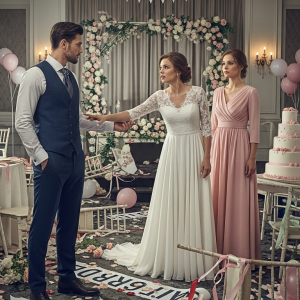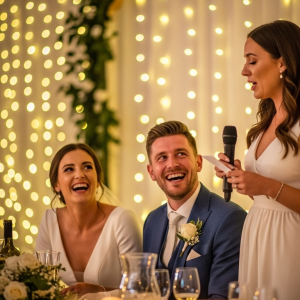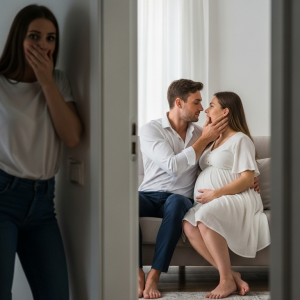My world fractured the day my mother died. I was nine years old, and the vibrant colors of my life bled into a muted, uncertain gray. My mother was the sun; without her warmth, everything felt cold and fragile. For a while, I clung to the hope that my dad, Mike, would be my anchor. He was in his mid-thirties then, lost in his own fog of grief, but I believed—with the unshakeable faith of a child—that he would step up. He was my father, after all.
He didn’t.
For about a year, it was just the two of us, stumbling through a new, hollow routine. Then came Jane. She was twelve years younger than him, a whirlwind of bright lipstick and sharp smiles that never quite reached her eyes. The first night she came for dinner, I remember watching her, a knot of unease tightening in my stomach. She moved in quickly, and with her came Betty, her seventeen-year-old daughter.
Betty was a monument to indulgence. From the moment they crossed the threshold, our home became their kingdom, and I, its resident ghost. Jane didn’t just redecorate the living room; she redecorated our lives, placing herself and Betty at the center of everything. My dad, seemingly mesmerized, just let it happen. His priorities shifted so suddenly it gave me vertigo. He was no longer my dad; he was Jane’s husband, and I was just… there. An inconvenient relic of his past life.
The chores started subtly. At first, it was small things, but soon it became an unspoken rule: Betty made the mess, and I cleaned it up. She was seventeen but lived with the carelessness of a toddler, leaving a trail of clothes, dishes, and clutter in her wake. Jane would watch me scrub floors or wash dishes with a patronizing smile. “It’s good practice for when you have your own home one day, dear,” she’d say, while Betty was out with friends or lounging on the sofa, scrolling through her phone. My dad would sit in his armchair, eyes glued to the television, utterly silent. He never intervened. He never defended me. His silence was a constant, ringing confirmation of my worthlessness in this new family.
The true breaking point, the moment that shattered any remaining illusion of family, came that first Christmas. They were all going on a ski trip to a beautiful cabin in the mountains. I was buzzing with excitement, picturing snow and hot chocolate. Family time. But they had other plans.
“You’ll be staying home,” Jane announced, not even looking at me as she packed a suitcase. “Someone has to look after Betty’s dog, Max.”
The air left my lungs. They were leaving me behind. For a dog.
“We could board him,” I whispered, my voice trembling. “Or find a pet sitter.”
Jane finally looked at me, her eyes cold. “And waste all that money? Don’t be ridiculous. You’re perfectly capable of looking after the house for three days.”
I was nine years old.
That Christmas Eve, I sat alone in the vast silence of our living room, the only light coming from the twinkling tree lights that felt like a cruel joke. I was scared, heartbroken, and consumed by a rage too big for my small body. My own father had left me alone on Christmas to go on vacation with his new family. It was no longer a suspicion; it was a fact. I was not part of that family.
Just when the loneliness felt like it would swallow me whole, the doorbell rang. It was my Aunt Sarah, my mother’s sister, with my cousin Danny. They had heard what happened. They came armed with presents, a home-cooked turkey, and a warmth that chased the shadows from the room. Danny, a few years older than me, stayed the whole time, helping me with Max and making me laugh until my sides hurt.
That night, surrounded by their love, I understood. Family isn’t about the roof you share or the blood in your veins. It’s about who shows up. And my dad, Jane, and Betty hadn’t just left for a vacation; they had shown me exactly who they were.
The years that followed the Christmas betrayal settled into a predictable, grinding rhythm. I was no longer a daughter in that house; I was a function, a pair of hands to keep the household running. By the time I was sixteen, I was managing the laundry, the dishes, the vacuuming—the invisible labor that kept Jane and Betty’s world pristine and comfortable.
My attempts to connect with my father became fewer and farther between. Once, when I was fourteen, I gathered the courage to talk to him. I found him in the garage, tinkering with his old tools. I told him it wasn’t fair that I did everything while Betty did nothing. He didn’t even look up from the workbench. “Life isn’t always fair, Clara,” he said, his voice flat. “You just have to learn to deal with it.” That was it. No empathy. No support. Just a dismissal. After that, I stopped trying.
My real life happened outside those walls, in the warm embrace of Aunt Sarah’s home. Danny became the sister I never had. She was the one I called after Jane screamed at me for not folding the laundry to her impossible standards. It was during one of those weekends at their house, curled up on the sofa, that Danny looked at me with serious eyes.
“You know this isn’t normal, right?” she said gently. “You’re not supposed to be treated like this.”
Her words struck me with the force of a physical blow. I had been submerged in that toxic environment for so long that I’d forgotten what clean air felt like. That was the moment something inside me shifted. A quiet resolve began to harden in my heart. I stopped trying to earn Jane’s approval or my father’s attention. I poured all my energy into my schoolwork, my head down, my eyes fixed on a future far away from that house.
My full scholarship to college was not just an acceptance letter; it was my key to freedom. The day I left, Jane offered a half-hearted “good luck” without looking up from her magazine. Betty was nowhere to be seen. My dad, however, surprised me. He hugged me, a stiff, unfamiliar gesture, and told me he was proud of me. The words felt hollow, years too late to mean anything. I was just focused on the open road ahead.
College was a rebirth. I made friends, excelled in my classes, and for the first time since my mother died, I felt like I could breathe. Aunt Sarah and Danny remained my steadfast support system, my true north.
Then, halfway through my first semester, the past came calling. It was a message from Betty. After years of barely acknowledging my existence, she was suddenly my best friend, asking about my classes with a nauseatingly fake sweetness. Then came the real reason for her call. She had failed a couple of classes and was on the verge of academic probation.
“Hey, would you mind helping me out?” her text read. “Maybe write a couple of essays for me? I know you’re really smart, and it would mean so much.”
The audacity was breathtaking. After treating me like her personal servant for years, she now wanted me to do her homework. I considered unleashing years of pent-up frustration, but she wasn’t worth the energy. I simply replied, “Sorry, Betty. I have my own work to focus on. Good luck with your classes.”
Her response was immediate, a pathetic attempt at manipulation. “I thought we were family! You’re supposed to help your sister!”
Sister. The word was so foreign, so utterly devoid of truth, that I didn’t even bother to reply.
Of course, Jane called next, her voice dripping with venom. She called me selfish, ungrateful. “After everything we’ve done for you, this is how you repay us? By turning your back on family?”
“Grateful for what?” I asked, my voice dangerously calm. “For treating me like the unpaid help? For leaving me alone on holidays? You don’t get to call me family only when you need something.”
I ended the call, my hand shaking but my resolve firm. It was the first time I had ever truly set a boundary with them. The final call came from my dad, playing his usual role of the reluctant peacemaker. He used the same tired lines about family sticking together.
I almost laughed. “Where was this ‘family’ when I was nine and alone on Christmas, Dad? Where was it when I was scrubbing floors while your new family relaxed? I’m not her safety net. This is not my problem to solve.”
He sighed, a sound of weary defeat. “I’m disappointed, but I understand.”
I hung up, a strange mix of pride and sorrow washing over me. I had finally stood up for myself, but in doing so, I had to accept that the father I once knew was well and truly gone.
Years passed. I graduated, landed a great job, and built a life for myself—a life filled with real friends and the unwavering love of Aunt Sarah and Danny. The silence from my father’s house was a welcome peace. But peace, I was learning, was a temporary state.
One day, an email from my dad appeared in my inbox. The subject line was simply: “We need to talk.” A familiar dread coiled in my gut. We met at a sterile coffee shop, a place devoid of memories. He looked older, tired, the lines on his face deeper than I remembered. Jane was with him, her expression as cold and unyielding as ever.
After some awkward pleasantries, Jane got straight to the point, her voice coated in a thin veneer of civility. “Your father and I have been talking about the future,” she began. “And we think it’s time for you to start thinking about your responsibilities.”
“My responsibilities?” I asked, confused.
“Betty,” she said, as if it were the most obvious thing in the world. “She’s going to need some help getting settled in life. You’re doing so well for yourself, and we thought it would only be fair for you to… give her a little boost.”
I stared at them, speechless. They weren’t just asking for help. They were asking me to fund the life of the person who had made mine a living hell. The same Betty who had failed out of school and, as I’d heard through the grapevine, had racked up a significant amount of debt through sheer irresponsibility.
I leaned back, a bitter laugh escaping my lips. “Let me get this straight. You want me to take the money I’ve worked hard to earn and just hand it over to Betty, because she can’t get her life together?”
“It’s what family does,” Jane said, her jaw tight.
That’s when the dam broke. All the years of silent resentment, of swallowed anger, came rushing to the surface.
“Family?” I said, my voice low and shaking with fury. “Don’t you dare talk to me about family. You are not my family. You never were. You never helped me. You let me clean up after her, you left me behind, you made me feel like nothing. And now, after all that, you have the nerve to ask me to save her?”
My dad stared down at his hands, a portrait of shame. Jane’s face hardened into a mask of indignation. “You’re being selfish. We gave you a home!”
“You gave me a roof over my head in exchange for a live-in maid!” I retorted, standing up so abruptly my chair scraped against the floor. “I don’t owe you anything. I built my life on my own, with no help from either of you. If Betty needs support, then maybe it’s time you two finally step up. But I am done. We are done.”
I walked out without looking back, my heart pounding with a fierce, liberating energy. I had finally said it all.
A few months later, my dad called one last time. He sounded broken. Betty had dropped out of school completely and was in serious financial trouble. He met me at the same coffee shop, alone this time. He didn’t ask for money directly, but his story was a clear plea.
I listened patiently, and when he was done, I looked him in the eye. “Dad, I have to say this one last time. I am not responsible for Betty. You and Jane made your choices years ago. You chose her. You prioritized her. I accepted that. Now, you have to live with the consequences of that choice. I will not be your backup plan.”
He looked shocked, as if he’d never considered his own accountability. For the first time, a flicker of something—maybe true remorse—crossed his face.
“I’m sorry,” he whispered. “I didn’t realize… how much we hurt you.”
The apology hung in the air between us, a ghost of what could have been. But it was too late. An apology couldn’t mend the years of neglect. I didn’t say anything back. I simply finished my coffee, stood up, and left him sitting there alone.
I haven’t heard from him since. I don’t know what happened to Betty, and I don’t care to know. My life is my own now, forged not from blood, but from choice. And I choose the family that chose me back: Aunt Sarah and Danny. They are my home.




